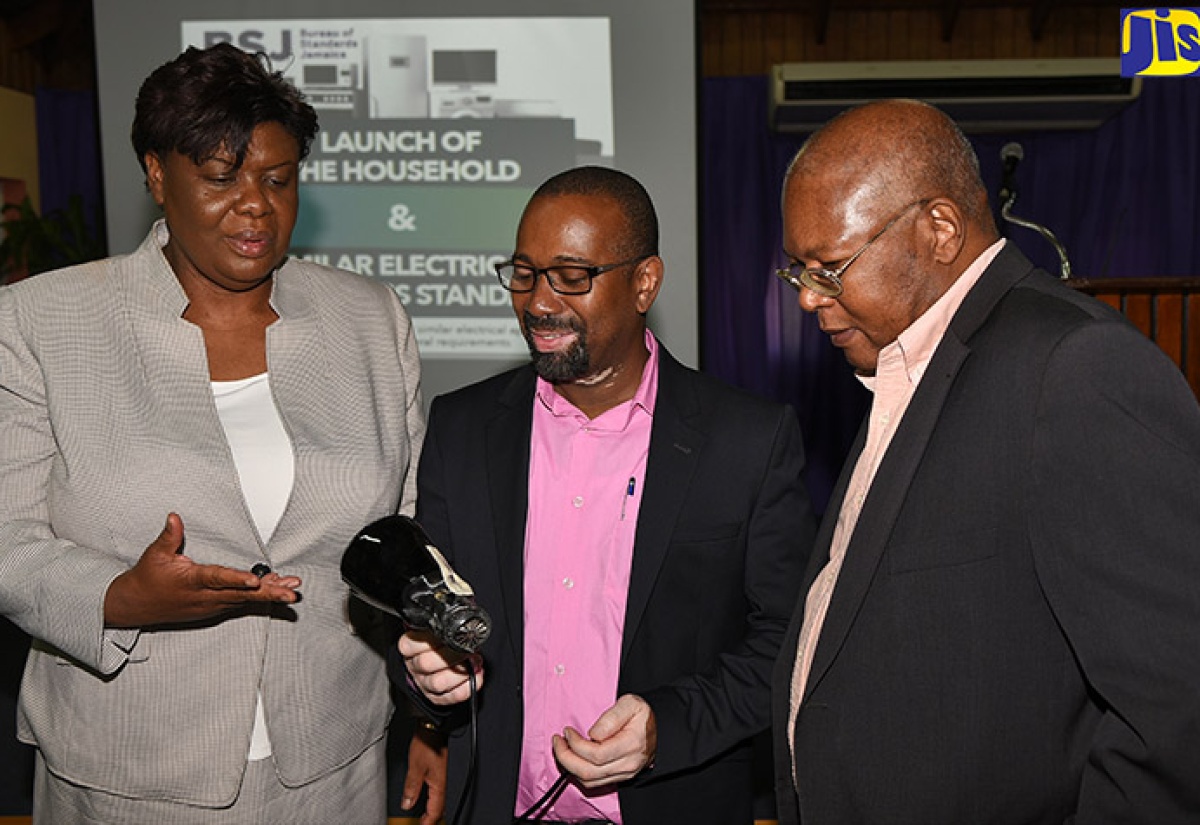BSJ Launches New Standard for Electrical Appliances
By: , March 5, 2018The Key Point:
The Facts
- It also covers battery-operated appliances and other direct current (DC) supplied appliances, and appliances not intended for normal household use, but nevertheless may be a source of danger to the public as well as children.
- Addressing the launch, Senior Energy Engineer in the Science, Energy and Technology Ministry, Mark Williams, said implementation of the standard will lead to greater empowerment of consumers, “allowing them to be more informed when purchasing appliances for their homes.”
The Full Story
The Bureau of Standards Jamaica (BSJ) has launched a new standard that will cover general safety requirements for electrical appliances for household and similar purposes.
Launched on March 2 at the Bureau’s office, in Kingston, the new standard, known as JS IEC 60335-1:2010 (AMD1:2013+ AMD2:2016), will also cover voltages for appliances not more than 250 for single-phase units and 480 volts in other appliances.
It also covers battery-operated appliances and other direct current (DC) supplied appliances, and appliances not intended for normal household use, but nevertheless may be a source of danger to the public as well as children.
The standard replaces the JS144: Part 1:1987 Jamaican Standard Specification for Safety of Household and Similar Electrical Appliances—General Requirements.
It does not cover appliances intended exclusively for industrial purposes, personal computers and similar equipment and transportable motor-operated electric tools.
Addressing the launch, Senior Energy Engineer in the Science, Energy and Technology Ministry, Mark Williams, said implementation of the standard will lead to greater empowerment of consumers, “allowing them to be more informed when purchasing appliances for their homes.”
“It will also give a sense of confidence seeing a label that indicates that the equipment has been tested, certified and safe for use,” he said.
Mr. Williams acknowledged that the standard represents a small part of the wider energy strategies that the country is currently pursuing.
He commended the BSJ on the new standard and pointed out that it is directly in tandem with goal one of the National Energy Policy, which seeks to ensure that Jamaicans use energy wisely, and aggressively pursue opportunities for energy conservation and efficiency.
“Residential appliances and equipment represent one of the fastest growing energy loads. Therefore the development of these standards is critical to the whole process of promoting energy efficiency in the use of household and similar electrical appliances,” he said.
Meanwhile, Director General in the Ministry of Industry, Commerce, Agriculture and Fisheries, Vivian Brown, commended the BSJ for its continued support of the electrical industry.
He emphasised the role the Government will continue to play in the protection of the health and safety of consumers, while at the same time, “providing them with crucial information to guide their choice when purchasing household and electrical appliances.”
Data provided by the Director General showed that between April and September 2017, local consumers made 196 complaints to the Consumer Affairs Commission (CAC) relating to electrical equipment and appliances.
“This showed an increase from the 176 complaints in 2016, a movement of 11.4 per cent,” he noted.
Additionally, in 2017, the Jamaica Fire Brigade reported that over the previous three years there had been a steady increase in residential fires caused by defective electrical wiring, faulty or failed appliances or damaged appliance cables.
“Standards are critical in the conformity of our products and services with international standards, and providing assurance to consumers on the quality, safety and reliability of these products and services (is necessary),”he said.
For her part, Chief Executive Officer (CEO) of the CAC, Dolcie Allen, said standards should become a way of life for consumers and not only during times of trouble.
“We will be working with the Bureau and also with the (vendors) of these electrical items to see how much we can educate our consumers on doing their due diligence,” she said.


